牛津高一下unit 3
牛津译林版 江苏英语必修一 unit3单词

跳过,略过;蹦跳着走vt.&vi.
适当地adv.
主要地;通常adv.
身体,(器官)系统;体系;制度n.
皮肤n.
认为,算作;重要vi.
/数数vt.
平静的;和平的adj.
集中(注意力、思想等);全神贯注vt.&vi.
数量n.
事实上,其实
丧失,丢失,损失n.
增加;获得,赢得vt.
令人疼痛的,痛苦的adj.
损害,伤害vt.& n.
有吸引力的,有魅力的adj.
尴尬的,不好意思的,难为情的adj.
压力n.
肥胖的,体重超标的adj.
节食;日常饮食n.
/节食,控制饮食vi.
节食
更喜欢vt.
腰,腰部;腰围n.
受苦;遭受(磨难)vt.&vi.
运动员n.
效果,作用;影响n.
副作用
(头发等)脱落
锻炼
苗条的,纤细的adj.
体形;数字;人物n.
惭愧的,羞愧的adj.
减肥,瘦身n.
药丸,药片ห้องสมุดไป่ตู้.
千克,公斤n.
起作用,有效果,奏效vi.
精力充沛的,充满活力的adj.
复原,恢复健康vi.
/重新获得vt.
肝脏n.
衰退,衰竭;失败;故障,失灵n.
包含;容纳vt.
化学物质n.
/化学的adj.
治疗;待遇;处理n
影响;(病毒)感染vt.
成就n.
(在网上发布的)帖子n.
会员资格,成员资格n.
包括prep.
分支;分布;树枝n.
在市中心,往市中心(尤指商业中心区)adv.
<美>高速公路n.
新牛津模块三unit2Natural disasters基础知识讲练(含答案)
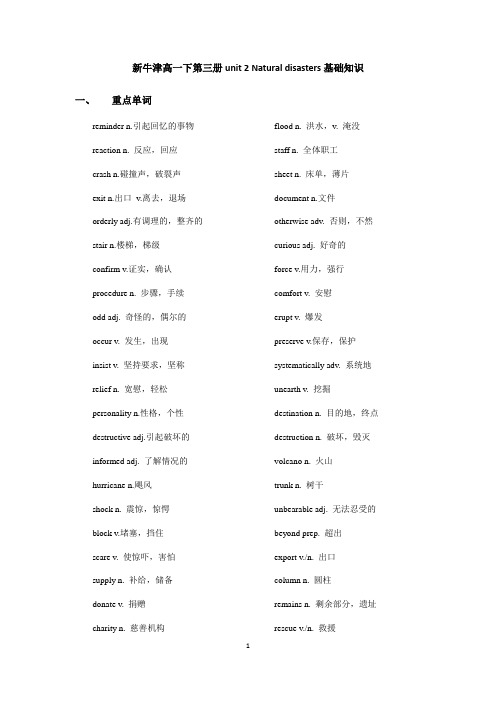
新牛津高一下第三册unit 2 Natural disasters基础知识一、重点单词reminder n.引起回忆的事物reaction n. 反应,回应crash n.碰撞声,破裂声exit n.出口v.离去,退场orderly adj.有调理的,整齐的stair n.楼梯,梯级confirm v.证实,确认procedure n. 步骤,手续odd adj. 奇怪的,偶尔的occur v. 发生,出现insist v. 坚持要求,坚称relief n. 宽慰,轻松personality n.性格,个性destructive adj.引起破坏的informed adj. 了解情况的hurricane n.飓风shock n. 震惊,惊愕block v.堵塞,挡住scare v. 使惊吓,害怕supply n. 补给,储备donate v. 捐赠charity n. 慈善机构flood n. 洪水,v. 淹没staff n. 全体职工sheet n. 床单,薄片document n.文件otherwise adv. 否则,不然curious adj. 好奇的force v.用力,强行comfort v. 安慰erupt v. 爆发preserve v.保存,保护systematically adv. 系统地unearth v. 挖掘destination n. 目的地,终点destruction n. 破坏,毁灭volcano n. 火山trunk n. 树干unbearable adj. 无法忍受的beyond prep. 超出export v./n. 出口column n. 圆柱remains n. 剩余部分,遗址rescue v./n. 救援sharp adj. 灵敏的faithfulness n. 忠诚locate v. 把... 安置在impact n. 巨大影响cloud-capped 高耸人云的import v./n. 进口二、重点短语natural disasters 自然灾害escape from 从...逃离hear about 听说,得知at large 整个,全部hold on to 抓紧roll call 点名safe and sound 安然无恙的keep one’s head 保持冷静to one’s relief 使某人宽慰的是tie down 绑住,拴住keep sb. informed 不断给某人提供最新信息power failure 停电take the form of...呈现...的形状take notes of 记下in detail 详细地go through 通读,查阅break out 爆发in the distance 在远处far and wide 到处,各处have a/ an ...impact on 对...有...影响in all directions 向四面八方in case (of)以防,万一donate...to 捐赠...给三、词汇拓展1. react v.反应,回应n.2. confirm v.确认,证实adj. 证实的n.证实,确认3. relieve v.减轻,缓解n. 减轻,缓解4. person n. 个人adj.个人的n.个性,人格5. prepare v. 准备n.准备adj.准备好的6. destruct v. 毁灭adj.毁灭的n. 毁灭7. inform v.告知adj. 了解情况的8. shock v.使震惊/ n.震惊adj. 令人震惊的adj. 感到震惊的9. scare v. 使害怕adj.令人害怕的adj.感到害怕的10. donate v. 捐赠n. 捐赠n.捐赠者11. curious adj.好奇的n.好奇12. system n. 体系,系统adv. 系统地adj.系统的13. bear v. 忍受adj. 忍受的adj.难以忍受的14. faith n. 信念adj. 忠诚的n.忠诚15. locate v. 将...安置在n.位置,地点【参考答案】1. react v.反应,回应reaction n.2. confirm v.确认,证实confirmed adj. 证实的confirmation n.证实,确认3. relieve v.减轻,缓解relief n. 减轻,缓解4. person n. 个人personal adj.个人的personality n.个性,人格5. prepare v. 准备preparation n.准备prepared adj.准备好的6. destruct v. 毁灭destructive adj.毁灭的destruction n. 毁灭7. inform v.告知informed adj. 了解情况的8. shock v.使震惊/ n.震惊shocking adj. 令人震惊的shocked adj. 感到震惊的9. scare v. 使害怕scary adj.令人害怕的scared adj.感到害怕的10. donate v. 捐赠donation n. 捐赠donator n.捐赠者11. curious adj.好奇的curiosity n.好奇12. system n. 体系,系统systematically adv. 系统地systematic adj.系统的13. bear v. 忍受bearable adj. 忍受的unbearable adj.难以忍受的14. faith n. 信念faithful adj. 忠诚的faithfulness n.忠诚15. locate v. 将...安置在location n.位置,地点16. erupt v. 爆发eruption n. 爆发一、单词拼写(用本部分所学单词)1.More than one passenger was injured in the air c .2.I was wearing a seat belt.If I hadn't been wearing one,I would have been (使使使).3.Since COVID-19 has largely been brought under control, people in that country return to their work in an(有条理的)manner.4.The researchers say they will carry out more studies to(确认)the results.5.In the past,there was often an automatic(反应)to increased traffic:just widen the roads.6. They left the building through an emergency_________(出口)and escaped the fire.7.There is a great sense of(宽慰)that nobody was killed or seriously injured in the car accident.8.All the athletes got ready,waiting for the(信号)to start running.9.Once the book you've requested is delivered to the nearest branch, they will(通知)you by e-mail, so you can pick it up.10.If such a(灾难)should(发生),the damage would be incalculable.11.People celebrate to show that they are grateful for the year's(使使使of food.12.The new schoolbags and books(使使使by some warm-hearted people arrived at the village school the day before yesterday.13.We yelled at the bear,hit pots hard, and fired blank shotgun shells into the air.Sometimes loud noises like these will (使使使bears off.14.We raised some money to a(使使使使使to help the homeless in the flood-stricken areas.15.Strong storms and high winds sometimes bring(使使使to coastal areas.【使使使使】1.c rash 2.injured 3.organized 4.confirm 5.reaction 6.exit 7.relief 8.signal 9.inform 10.disaster occur 11.supply 12.donated 13.scare 14.charity 15.flood二、课文语法填空阅读下面短文,在空白处填入1个适当的单词或括号内单词的正确形式。
Unit 3 Grammar 讲义-高一英语牛津译林版(2020)必修第一册
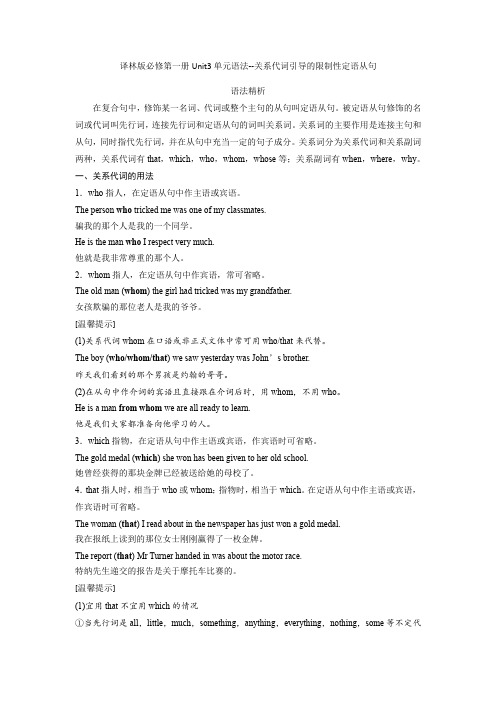
译林版必修第一册Unit3单元语法--关系代词引导的限制性定语从句语法精析在复合句中,修饰某一名词、代词或整个主句的从句叫定语从句。
被定语从句修饰的名词或代词叫先行词,连接先行词和定语从句的词叫关系词。
关系词的主要作用是连接主句和从句,同时指代先行词,并在从句中充当一定的句子成分。
关系词分为关系代词和关系副词两种,关系代词有that,which,who,whom,whose等;关系副词有when,where,why。
一、关系代词的用法1.who指人,在定语从句中作主语或宾语。
The person who tricked me was one of my classmates.骗我的那个人是我的一个同学。
He is the man who I respect very much.他就是我非常尊重的那个人。
2.whom指人,在定语从句中作宾语,常可省略。
The old man (whom) the girl had tricked was my grandfather.女孩欺骗的那位老人是我的爷爷。
[温馨提示](1)关系代词whom在口语或非正式文体中常可用who/that来代替。
The boy (who/whom/that) we saw yesterday was John’s brother.昨天我们看到的那个男孩是约翰的哥哥。
(2)在从句中作介词的宾语且直接跟在介词后时,用whom,不用who。
He is a man from whom we are all ready to learn.他是我们大家都准备向他学习的人。
3.which指物,在定语从句中作主语或宾语,作宾语时可省略。
The gold medal (which) she won has been given to her old school.她曾经获得的那块金牌已经被送给她的母校了。
4.that指人时,相当于who或whom;指物时,相当于which。
牛津译林版高一英语必修一Unit3练习试题及答案
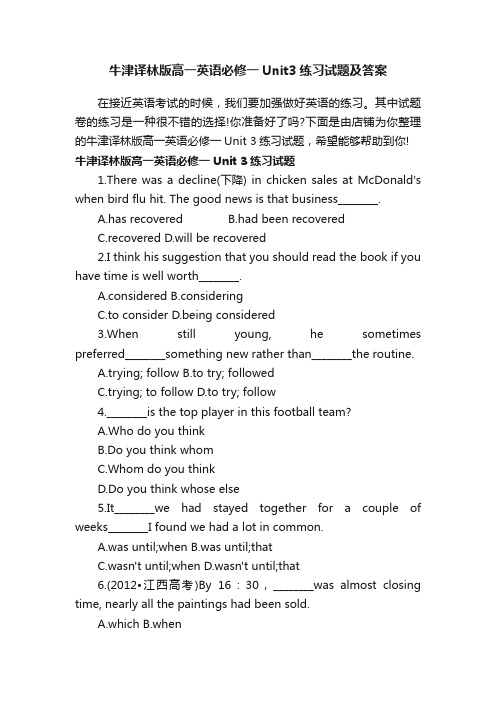
牛津译林版高一英语必修一Unit3练习试题及答案在接近英语考试的时候,我们要加强做好英语的练习。
其中试题卷的练习是一种很不错的选择!你准备好了吗?下面是由店铺为你整理的牛津译林版高一英语必修一Unit 3练习试题,希望能够帮助到你! 牛津译林版高一英语必修一Unit 3练习试题1.There was a decline(下降) in chicken sales at McDonald's when bird flu hit. The good news is that business________.A.has recoveredB.had been recoveredC.recoveredD.will be recovered2.I think his suggestion that you should read the book if you have time is well worth________.A.consideredB.consideringC.to considerD.being considered3.When still young, he sometimes preferred________something new rather than________the routine.A.trying; followB.to try; followedC.trying; to followD.to try; follow4.________is the top player in this football team?A.Who do you thinkB.Do you think whomC.Whom do you thinkD.Do you think whose else5.It________we had stayed together for a couple of weeks________I found we had a lot in common.A.was until;whenB.was until;thatC.wasn't until;whenD.wasn't until;that6.(2012•江西高考)By 16:30,________was almost closing time, nearly all the paintings had been sold.A.whichB.whenC.whatD.that7.(2013•岳阳高一调研)________improve her English, Jenny bought a lot of tapes for herself.A.So as toB.In order thatC.So thatD.In order to8.The chance should be made________, since you have got it.A.up ofB.the most ofC.best ofD.a good use of9.For the reason________,I can't finish it________.A.of my own;with my ownB.on my own;of my ownC.of my own;on my ownD.of my own;to my own10.—________in such a hurry?—I don't know.She might have been running to catch the train.A.Why do you think was JaneB.Why do you think Jane wasC.Do you think why Jane wasD.Do you think why was Jane11.None of them could understand your meaning,________?A.could theyB.didn't heC.do theyD.could it12.He used to________cards, but now he is used to________a walk after supper.A.play; takingB.playing; takeC.play; takeD.playing; taking13.—You forgot your purse when you went out.—Good heavens,________.A.so did IB.so I didC.I did soD.I so did14.(2012•山东高考)Maria has written two novels, both of________have been made into television series.A.themB.thatC.whichD.what15.Rose couldn't concentrate________what she was doing________her family were watching TV.A.to;whenB.on;whileC.for;whenD.in;whileSection B(18 marks)Do you know Eskimos (爱斯基摩人)? Let me tell you something about their__16__.The Eskimos live near the North Pole . There are only two__17__there, winter and summer, There are no spring or autumn there. The winter nights are__18__. You can't__19__the sun for more than two months, even at noon. The summer days are long. For more than two months, the sun never__20__and there is no night.The Eskimos have__21__clothes. They make their clothes from the skin of animals. From these skins they make coats, caps and__22__.Near the North Pole trees can't grow, for it is too__23__there. The Eskimos have to make their houses from skins, snow or stones. When they__24__in storm and can't__25__home, they make house of snow. They__26__these snow houses when the storm is over.Life is__27__for the Eskimos, but they still like to live there.16.A.work B.lifeC.holidayD.families17.A.weather B.seasonsC.monthsD.years18.A.short B.warmC.longD.cold19.A.see B.watchC.lookD.look at20.A.rises B.goes upC.dropsD.goes down21.A.beautiful B.metalC.warmD.cool22.A.goods B.drinksC.medicineD.shoes23.A.cold B.hotC.dryD.wet24.A.go out B.go overC.keep onD.get on25.A.get back B.got offC.get onD.get in26.A.make B.leaveC.stayD.break。
(完整word版)模块3Unit3知识点讲解
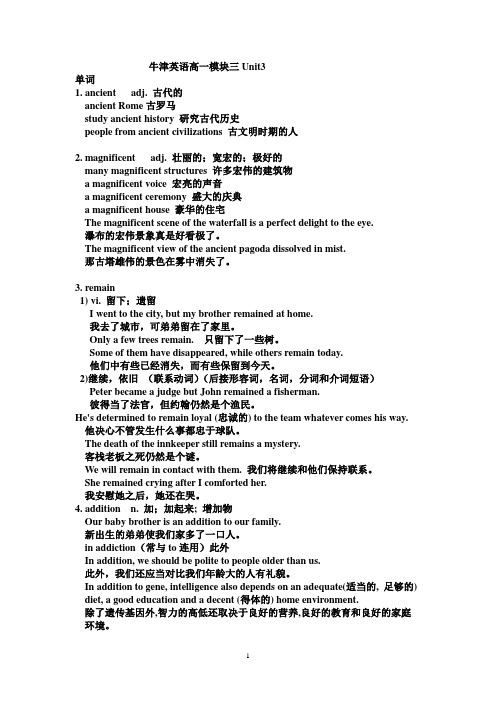
牛津英语高一模块三Unit3单词1. ancient adj. 古代的ancient Rome古罗马study ancient history 研究古代历史people from ancient civilizations 古文明时期的人2. magnificent adj. 壮丽的;宽宏的;极好的many magnificent structures 许多宏伟的建筑物a magnificent voice 宏亮的声音a magnificent ceremony 盛大的庆典a magnificent house 豪华的住宅The magnificent scene of the waterfall is a perfect delight to the eye.瀑布的宏伟景象真是好看极了。
The magnificent view of the ancient pagoda dissolved in mist.那古塔雄伟的景色在雾中消失了。
3. remain1) vi. 留下;遗留I went to the city, but my brother remained at home.我去了城市,可弟弟留在了家里。
Only a few trees remain. 只留下了一些树。
Some of them have disappeared, while others remain today.他们中有些已经消失,而有些保留到今天。
2)继续,依旧(联系动词)(后接形容词,名词,分词和介词短语)Peter became a judge but John remained a fisherman.彼得当了法官,但约翰仍然是个渔民。
He's determined to remain loyal (忠诚的) to the team whatever comes his way. 他决心不管发生什么事都忠于球队。
牛津译林版高一下英语必修三Unit1单词表词组

必修三Unit 11.harm n.&vt. 伤害,损害[U]do sb/sth harm 对某人/某物有害do harm to...对......有害harm one’s reputation/image 损害某人的声誉/形象☆harmful adj 有害的be harmful to 对...有害(反义短语:be good for 对...有好处)harmless adj 无害的be harmless to... 对...无害harmlessly adv 无害地;无恶意地2.soil n. 土壤;国土,领土,土地[U,C]soil erosion 水土流失;土壤侵蚀soft soil 软土soil water 土壤水3.ecosystem n. 生态系统[C]natural ecosystem 自然生态系统agricultural ecosystem 农业生态系统☆ecology n 生态学[U]ecological adj 生态的4.overseas adj. 海外的,国外的(同:oversea)adv. 在海外,向国外overseas chinese 华侨,海外华人overseas market 海外市场overseas investment 海外投资5.region n. 地区,区域;行政区[C]autonomous region 自治区special administrative region 特别行政区☆regional adj 地区的;局部的regionally adv 地域性地;地方地6.continent n. 大陆,陆地,洲[C]antarctic continent 南极大陆;南极洲☆continental adj 大陆的;大陆性的lion num. 一百万;许多,大量millions of 成千上万的☆millionaire n 百万富翁[C]8.length n. 长,长度;时间的长短;篇幅,(电影)片长in length 长度at length 最后,终于;详细地length of time 持续时间;时限☆long adj 长的lengthen vi&vt 延长;变长9.biodiversity n. 生物多样性[U]☆biology n 生物[U]biological adj 生物的diverse adj 不同的;多种多样的;变化多的diversity n 多样性[U];差异[U,C]10.species n. (pl. species) 种,物种[C]species diversity 物种多样性11.nut n. 坚果[C]crack a nut 破开坚果nuts and bolts 具体细节;基本要素☆nutty adj 多坚果的;产坚果的12.Brazil nut 巴西坚果13.lily n.百合(花)☆lily adj 洁白的;纯洁的14.water lily 睡莲lily pad 睡莲叶子15.variety n. 不同种类;变化,多样性;变种,变体a variety of 各种各样的可数名词复数或不可数名词varieties of 各种各样的☆vary vi 变化;改变vary with 随着...而变化vary in 在...方面变化/不同vary from... to...从...到...变化vary between... and... 在...和...之间变化various adj 各种各样的variously adv 各种各样地16.wildlife n. 野生动植物,野生生物[U]wildlife conservation 野生生物保护☆wildly adv 野生地;鲁莽地;野蛮地17.beneath prep. 在...下面,在...下方;配不上18.mass n. 大量[C,sing];团,块,堆[C];一大群[sing]adj. 大批的,广泛的a mass of 一堆;大量mass production 大量生产☆massive adj 大量的;巨大的;厚重的massively adv 大量地;沉重地;庄重地19.towering adj. 高大的,高耸的;出色的☆tower n 塔[C]vi 高耸;超越20.hardwood n. 阔叶树;硬材(阔叶树的木材)[U,C] hardwood floor 硬木地板;实木地板21.living adj. 活着的,活的;在使用的all living things 所有生物n. 生计,谋生[C,sing];生活方式[U]earn/make a living谋生earn one’s living 谋生☆区别:live 意为“活着的;建在的”,一般指物;还可以表示“现场直播的”,作定语或表语alive 意为“活着”,既可指人也可指物,多做表语、后置定语或宾补living 意为“活的;活着的”。
上海市牛津版英语【高一下】Unit 3综合Test 2(无答案)

Test 2 for Unit 3Part I. Grammar and V ocabulary.Section ADirections: Choose the answer that best completes the sentence.1. The days are gone______physical strength was all you needed to make a living .A.whenB. thatC. whereD. which2. She showed her visitors around the museum, the construction _______has taken more than three years.A. for whichB. with whichC. of whichD. to which3. The school trip , ________customers are mainly students , is closed for the holidays.A. whichB. whoseC. whenD.where4. Mary was much kinder to Jack than she was to the others , ________, of course , made all the others upset.A. whoB. whichC.whatD. that5. I walked up to the top of the hill with my friend, _________we enjoyed a splendid view of the lake .A. whichB. whereC. whoD. that6. Ted came for the weekend wearing only some shorts and a T-shirt, ______is a stupid thing to do in such weather.A. thisB. thatC. whatD. which7. Between the two parts of the concert is an interval , ______the audience can buy ice-cream.A.whenB. whereC.thatD. which8. The prize will go to the writer _____story shows the most imagination.A. thatB. whichC. whoseD. what9. English is a language shared by several diverse cultures, each of _____uses it somewhat differently .A.whichB. whatC. themD. those .10. A bank is the place ______they lend you an umbrella in fair weather and ask for it back when it began to rain.A. whenB. thatC. whereD. there11. Julie was good at German, French and Russian, all of ______she spoke fluently.A. whoB. whomC. whichD.that12. Whatever is left over may be put into the refrigerator, ______it will keep for two or three weeks.A. whenB. whichC. whereD. whileSection BDirections: Read the following two passages. Fill in the blanks to make the passage coherent. For the blanks with a given word, fill in each blank with the proper form of the given word. For the other blanks, fill in each blank with one proper word. Make sure that your answers are grammatically correct.The passage introduces us some kinds of plants. Water lilies are often seen in China. There is a kind of water lily called Victoria Lily , ________pads are so huge that aperson can stand on them. It is also the largest kind of water lily in the world. The lotus is near relative of the water lily , the long white root _____ _______ can be eaten . The banyan tree, which can _______( find ) in South China and other parts of Asia, is an interesting tree with many roots______( grow) down from its branches. The world’s largest banyan tree, in India, ______(cover) an area larger than a football pitch. It looks like a forest. A gingko tree , recently _______(discover) in Hebei , has lived for 2800 years . Many gingko trees have been around for more than 1,000years -----that is the reason ______they are known as “ longevity trees” in China. However, they are not even near being the oldest trees. Bristlecone pine trees in America are among the ______(old) living trees , with one being over 4,600 years old!Section CDirections: Complete the following passage by using the words in the box. Each word can only be used once. Note that there is one word more than you need.The term home schooling means educating children at home or in places other than a normal setting such as a public or private school. There are many reasons why parents choose home schooling for their children. Some parents are21with the quality of education in the public schools. Others do not want their children to have to worry about "peer pressure", or social pressure from friends. They say it may have a(n)22effect on the child's studies.Bullying (欺负) from other students is another concern. Still other parents choose this type of23for religious reasons. Whatever the reason may be, it is __24___ that more and more children are being taken out of normal schools every year. As aresult, many questions have ____25____, encouraging the debate over home schooling against public schooling. What then is the future of education? Will this new model of schooling ____26____ normal schools? As the debate continues, so do the questions about what home schoolers are studying at home. How can parents ___27____ that their children are prepared well for college? __28___, there are questions ____29_____ the children's emotional development. Are they too isolated their fellow students? Are they missing the opportunity to get the social ___30.____ of being in a large classroom of students? As with any debatable issue, the answers to these questions are neither simple nor one-sided.Part II、Reading ComprehensionSection A:(15分)Directions: For each blank in the following passage there are four words or phrases marked A, B, C and D. Fill in each blank with the word or phrase that best fits the context.Fresh out of residency(住院实习期), I took a job in a small community hospital’s emergency department(抢救室). As the newest member of the group, I got last dibs on shifts. No one wanted to work on Christmas Eve__31__I was the newest member, so the shift went to me. I kiss my family goodbye and went off to spend the night in the hospital. It was a __32___job.At 9 pm, the ambulance brought in a man in his 60s who was having a heart attack. His face was pale, and he was___33____. I did my best and he hung in there. Before I left in the morning to spend Christmas with my family, I____34____ to see how he was doing. It was still touch-and-go, but he had survived the night and was sleeping.Emergency physicians don’t have __35____ relationships with patients like other doctors. We get the ___36___ sick. Often they are frightened. Sometimes they are angry at us just because we were there. They pass through our hands and out the door. We rarely__37___ them again.The following year, still the newest member of the group, I got Christmas Eve duty again. At 9 pm sharp, the hospital clerk told me there was a __38____ in the hall who wanted to speak to me. When I approached them, the man introduced himself as Mr. Lee and said, “You probably don’t remember me but last Christmas you_39____ my life. Thank you for the year you gave me.” He and his wife hugged me, handed me a small gift, and left. I was more than a surprised — and _40____.The following year a new doctor had joined the group, and my family was__41___that I could stay home Christmas Eve. But I wanted to see if Mr. and Mrs. Lee would__42____. This time I ____43__ for the shift. I kept an eye on the door. Once again, at exactly 9 pm, the Lees appeared, carry their new grandchild.The last year I saw him, he brought me a gift. It was a golden__44___engraved with a single word : Friendship.Now my family, friends and I ring that bell every Christmas Eve at exactly 9 pm and offer a toast to the man who didn’t__45____.31. A. though B. because C. if D. while32.A. thankless B. helpless C. meaningless D. effortless33. A.patient B. well C. frightened D. disappointed34. A. stopped by B. showed up C. woke up D. stood by35. A. continuing B. friendly C. direct D.specially36. A. regularly B. gradually C. slightly D. suddenly37. A. frequently B. never C. rarely D. hopefully38. A. friend B. doctor C. couple D. cousin39. A. saved B.enriched C. added D. spared40. A.interested B. moved C. shocked D. satisfied41. A. guilty B. certain C. delighted D. confused42. A. call B. visit C. thank D. reward43. A. waited B. looked C. longed D. volunteered44. A. board B. telephone C. bell D. clock45. A. leave B. forget C. change D. loseSection B (18分)Directions: Read the following three passages. Each passage is followed by several questions or unfinished statements. For each of them there are four choices marked A,B,C and D. Choose the one that fits best according to the information given in the passage you have just read.AMr. Harris used to work in Dover, but then he changed his work, and he and his wife moved to another town. They did not have many friends there, but they soon met a lot of interesting people, and after a few weeks, they often went to dinner or to parties at other people’s houses.Then Mrs. Harris said to her husband, “We’ve been to a lot of other people’s houses, and now we must invite them to our house, mustn’t we?”“Yes, certainly,” answered her husband, “A big party will be the easiest thing,won’t it? Then we can start to invite people to dinner in small numbers next month.”So Mrs. Harris said, “Yes, I’ll invite all our friends here to a big party on 5th December.”“How many will that be?” Mr. Harris asked. “Don’t invite too many.”Mrs. Harris was beginning to write the invitations when her husband saw that she was writing, “Party: 6:30 to 8:30 p.m.”“That isn’t very nice, is it?” he said. “You’re telling our guests that they must go at 8:30.” So Mrs. Harris just wrote “Party: 6:30 p.m.”A lot of guests came, and they all had a good time, so they did not go home at 8:30. In fact they were still there at mid-night when the door bell rang and a policeman arrived. He said, “You must stop making a noise, because someone has complained(抱怨).”Mr. Harris said he did not want to quarrel with the policeman, so everyone went home. They were sorry to have to go.When Mr. and Mrs. Harris were alone again, she said to him. “That was a surprise, wasn’t it? Who complained about the noise?”“I did,” Mr Harris answered in a tired voice.46. Why did Mr. Harris and his wife move to another town?A. They wanted to make some new friends.B. Mr. Harris changed his work.C. They wanted to meet a lot of interesting people.D. They enjoyed going to parties and visiting other people’s houses.47 What made Mr. and Mrs. Harris hold a party at their house?A. It was easy to hold a big party at home.B. They could ask people to dinner in small numbers.C. They had gone to other people’s parties many times.D. They liked making friends with others.48. How long would Mrs. Harris like the party to last?A. From the morning till night.B. About fourteen hours.C. About two hours.D. Till midnight49. When did the party end that evening?A. At about 8:30.B. When the policeman talked with Mr. Harris on the phone.C. About twelve o’clock..D. When someone telephoned the police station.BIn order to study enzymes(酶), a small piece of potato is cut into very thin pieces. These thin pieces are placed in a little glass container and covered with water. Then a little of the proper chemical is added. Immediately , because of the enzyme present in the potato , the chemical starts joining with the oxygen in the air above the water. . If the container(容器) is entirely closed., a partial vacuum (真空)is formed inside. If the container is now connected with a fine tube which is dipped in water , the water is sucked part away the tube because of the vacuum.The scientists doing the experiment carefully notice how far up the tube is whenwater is sucked in a certain time. The higher it is sucked , the more of that particular enzyme is in the potato . In this way , we can get exact ideas about quantities of enzyme and even about the way in which it operate. And all the time we are working with amounts far too small to see or weigh.50. What do the scientists want to find out in the experiment?a. Whether enzyme is present in the potato.b. What particular enzyme there is in the potato.c. How much enzyme there is in the potatod. How enzyme works in the potato.A. a and bB. c and dC. b and dD. a and c51.The proper title of the passage is ______A. How a Vacuum Is FormedB. How Enzyme Is StudiedC. How Enzyme Works in the PotatoD. How Much Enzyme There Is in the Potato52.Which of the following correctly shows how the experiment is done?A. Put very thin pieces of potato in a vacuum containerB. Connect the glass container with a tube through which oxygen is sent inC. Add some chemical to the water before thin pieces of potato are put inD. Place thin pieces of potato in a glass container , cover them with water and then close it .CWhat’s delicious, healthy to eat and comes in various colors? Eggplant! And no, it hasas an egg. It can be steamed, fried or baked. It can be eaten by itself or combined with meats and other vegetables.Eggplant was first grown in India during the 5th century B.C. Its popularity soon spread to China and then throughout Asia. Finally, during the Middle Ages the vegetable made its way to Europe. At that time, eggplant was not the shiny purple vegetable most people know today. Instead, it was like a white egg. Due to this egg-like appearance, eggplant got its name. In its early days, the vegetable was so bitter that people often called it a “mad apple”. This nickname started because people believed its bitterness was bad for one’s health. People actually thought eggplant could cause insanity(精神错乱) and cancer.Fortunately, today people know that eggplant doesn’t cause insanity or cancer. In fact, eggplant is so healthy that it may prevent cancer. In addition, the brain and the heart benefit from this supper vegetable. Since it is high in fiber, eggplant can also improve digestion.Italy, Turkey, Egypt, China and Japan are the leading growers of eggplant in the world today. Depending on its location, eggplant may be purple, green, orange or yellow-white. And it can be as small as a tomato or as large as a cucumber. Dish diversities(多样性) range from simple to complex, with all of them being delicious!Today, thousands of people are gathering in Loomis, Calif, for the 23rd annual Loomis Eggplant Festival. The main activity at the festival is eating delicious eggplant dishes. There is plenty more to do and see, though. Recipe contests, arts and crafts, performers, races and children’s activities all “egg-cite” festival-goers. Most people at the festival would agree — eggplant is an “egg-cellent” vegetable!53.What does the underlined word “versatile” in Paragraph 1 probably mean? A.simple in shape B.various in cookingC.diverse in size D.flexible in price54.Which of the following statements about eggplants is TRUE?A. Eggplant was once misunderstood by the people for its bitterness.B. Eggplant was introduced into Europe during the 5th century B.C.C. Eggplant got its name for its nutrition which is as rich as an egg.D. Eggplant looks like what it used to be in color and shape.55.The diversities of eggplant reflect in many aspects EXCEPT _____________. A.colors B.sizes C.dishes D.nutrition56.The passage mainly tells us about __________________.A.the 23rd annual Loomis Eggplant FestivalB.the general introduction of eggplantC.the origin of eggplantD.the benefits of eggplantSection CDirections: Read the following passage and then complete the statements and answer the questions on the answer sheet.[1]Queuing, warm beer and afternoon tea—what do they have in common? They are all part of British life, or so I thought. However, the ability to queue for long periods of time, once believed to be a typical traditional characteristic of the British, is no longer tolerated by people in the UK, according to a survey done by the Payments Council. It would seem they are no longer prepared to wait in line.[2]Once upon a time, queuing was seen as normal. During the Second World War,everyone had to queue up to receive their daily ration(配给)of foods. In fact, if you didn't stand up and wait in line with all the others, it was________uncivilized (不文明).The famous English doubledecker buses, with only one entrance, might also help explain why queuing was seen as a part of life. Almost always, there is a queue to get on.[3]But perhaps the British are tired of being pushed by the Spanish, the Italians or the French as they queue up to get a table at a restaurant. The people of these other European countries have more than one entrance to their buses, which could explain their more relaxed attitude to the queue.[4]Two minutes is now the longest time most British are prepared to stand and wait. But could it be that the Internet, which allows us to carry out tasks quickly, is the main reason why British people are no longer prepared to queue? As the Internet has become more popular among shoppers, impatience with queuing has increased.[5]“Used to buying without delay, customers are even abandoning purchases rather than wait their turn,”says Stuart Neal of Barclaycard. “Shoppers_are_also_less_likely_to_queue_for_longer_if_the_item_they_are_buying_ is of low value.”Perhaps I will have to replace“queuing”with“impatience”in my list of things I associate with the British.57.What is the main idea of the text? (no more than 8 words)_____________________________________________________________________58.Which of the fol1owing can be replaced by the following one?In the past queuing was thought to be a traditional feature of the British, but now they can't stand it any more._____________________________________________________________________59.Fill in the blank in Paragraph 2 with proper phrases.(no more than 4 words)_____________________________________________________________________60.Why do British people tend not to queue any longer? (no more than l5 words)_____________________________________________________________________Part III、Translation.Directions: Translate the following sentences into English, using the words given in the brackets.61.这里的菜烧的很好, 还有免费蛋糕供应。
牛津译林版高一英语必修一教案unit3
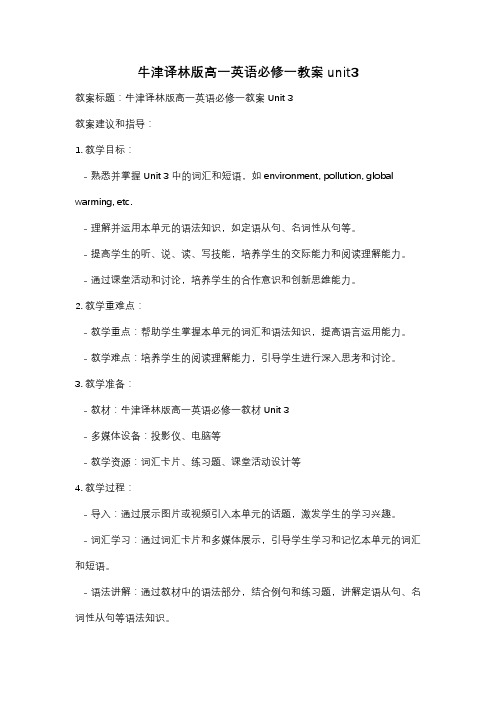
牛津译林版高一英语必修一教案unit3教案标题:牛津译林版高一英语必修一教案Unit 3教案建议和指导:1. 教学目标:- 熟悉并掌握Unit 3中的词汇和短语,如environment, pollution, global warming, etc.- 理解并运用本单元的语法知识,如定语从句、名词性从句等。
- 提高学生的听、说、读、写技能,培养学生的交际能力和阅读理解能力。
- 通过课堂活动和讨论,培养学生的合作意识和创新思维能力。
2. 教学重难点:- 教学重点:帮助学生掌握本单元的词汇和语法知识,提高语言运用能力。
- 教学难点:培养学生的阅读理解能力,引导学生进行深入思考和讨论。
3. 教学准备:- 教材:牛津译林版高一英语必修一教材Unit 3- 多媒体设备:投影仪、电脑等- 教学资源:词汇卡片、练习题、课堂活动设计等4. 教学过程:- 导入:通过展示图片或视频引入本单元的话题,激发学生的学习兴趣。
- 词汇学习:通过词汇卡片和多媒体展示,引导学生学习和记忆本单元的词汇和短语。
- 语法讲解:通过教材中的语法部分,结合例句和练习题,讲解定语从句、名词性从句等语法知识。
- 阅读理解:选择教材中的一篇阅读材料,设计问题和讨论活动,引导学生进行阅读理解和思考。
- 交流活动:设计小组讨论或角色扮演活动,让学生在小组内进行合作交流,分享自己的观点和想法。
- 语言运用:通过练习题和语言游戏,巩固学生对本单元词汇和语法的运用能力。
- 总结归纳:对本节课的重点内容进行总结和归纳,帮助学生理清思路和加深记忆。
- 作业布置:布置相关的作业,如课后练习题、写作任务等,巩固学生的学习成果。
5. 教学评估:- 通过课堂讨论、练习题和作业的批改,对学生的学习情况进行评估和反馈。
- 鼓励学生积极参与课堂活动,提高学生的学习兴趣和主动性。
6. 教学延伸:- 鼓励学生进行相关的课外阅读和研究,拓宽知识面和培养学生的自主学习能力。
- 1、下载文档前请自行甄别文档内容的完整性,平台不提供额外的编辑、内容补充、找答案等附加服务。
- 2、"仅部分预览"的文档,不可在线预览部分如存在完整性等问题,可反馈申请退款(可完整预览的文档不适用该条件!)。
- 3、如文档侵犯您的权益,请联系客服反馈,我们会尽快为您处理(人工客服工作时间:9:00-18:30)。
7. relative: ['relətiv] n. 同类事物 e.g.: The giant panda is a near relative of the polar bear. 大熊猫是北极熊的近亲。 Relative做名词解释还可以解释为“亲属,亲戚”,如: My aunt is my only immediate relative. 我姑妈是我唯一的至亲。 其他词性: relative adj. 关于…的 常用搭配: be relative to sth. 关于…;和…有关 e.g.: The detective tried to find important clues relative to the case. 侦探试图找到与案件有关的重要线索。 8.Root: n. 根 e.g.: If the roots of an apple tree are dug out, it will soon die. 如果苹果树的树根被挖出,它不久就会枯死。 其他词性: root v. (使)生根 e.g.: His love for his wife is deeply rooted. 他对妻子的爱是坚定不移地。
4. Pond: n. a small lake 池塘 e.g.: In early spring, you can see groups of ducks swim in the beautiful village pond. 在早春时节,你可以看到成群的鸭子在村中美丽的池塘里游泳。 Pond 通常指人工形成的池塘,如:A fish pond 鱼塘 a duck pong 鸭塘 5.centimeter [‘senti,mi:tə] n. 厘米 e.g.: The rope is fifty centimeters long. 这根绳子长50厘米。 6. flower v. 开花 e.g.: Many plants flowers in spring . 大多数植物在春天开花。 其他词性: flower n. 花 辨析: flower和blossom: blossom尤指果树或灌木的花朵。
1. water lily 睡莲 2. pad 浮叶
13. Branch 树枝 14. bark 树皮 15. trunk 树干 16. Separate 不同的;不相关的 [''sepərit] 17. enormous 巨大的 [i'nɔ:məs] 18. Pitch 场地;球场 19. Speak of 提起 20.Gingko tree 银杏树 21. Longevity 长寿 [lɔn'dʒevəti] 22. Bristlecone pine tree 狐尾松树 23. Nevada (美国)内华达州
3. Float 漂浮 4. Pond 池塘 5. Victoria lily 王莲 6. centimeter 厘米 [‘senti,mi:tə] 7. flower 开花 8. Lotus 荷花 9. Relative 同类事物 ['relətiv] 10. Root 根 11. serve 提供(饮食等) 12. Banyan tree 榕树
10. branch: n. 树枝 e.g.: The banyan tree usually has many roots which grow down from its branches. 榕树常在其枝节部生出许多向下生长的根。 Branch 还可以解释为“分支;分部;之流” 如: English is a branch of the Germanic family of languages. 英语是日耳曼语系的一个分支。 11.eventually: adv. 最终 e.g.: The young girl hoped to get a job on the local fashion magazine and eventually worked for Elle. 这个年轻的女孩希望在当地的时尚杂志社找一份工作。 她最终去《世界时尚之苑》工作了 近义词和词组: 1)at last 2) in the end 3) finally
9. Serve:v. to give (food or drink to sb.)提供(饮食等) e.g.: She served me a cup of tea. 她給我端上一杯咖啡。 Serve 作动词用,还有很多其他含义,如:“服务”,“供职”, “供应”,“接待”等。 e.g.: She served as a receptionist in the import and export company. 她在这家进口公司中 担任 前台接待员。 My cousin severed in the army in his early twenties. 我堂兄在20岁出头的时候在军中 服役 。 Small as it was, the power station served the town with elecrticity. 这座发电厂虽然规模小,但是它给整个小镇 供应电。 To be a qualified assistant, one must be able to serve every customer to their satisfaction. 要成为一名称职的售货员,就必须能把 每一位顾客 服务 到他们满意为止。
Vocabulary-- Exercise
A. Complete each sentence with the correct form of the words in the box. separate speak of relative branch float flower bark serve 1. Ms Tang likes drinking coffee, so she prefers going to restaurants where coffee______________. is served separate 2. It is better to keep the strangler fig tree________ from other trees. 3. The ________ of trees helps protect them. bark 4. Some leaves ________ on the pond. were/are floating 5. Grandma often goes to the countryside to visit her relatives distant________. flower 6. Generally speaking, most fruit trees________ in spring. 7. The naughty boy cut all the________ off that small tree. branches Speaking of 8. __________ novel, how many Harry Potter books have you read?
water lily 睡莲
Victoria lily 王莲
Lotus 荷花
banyan tree
榕树 gingko tree 银杏树
bristlecone pine tree
狐尾松树
2. pad 浮叶 e.g.: I happened to see several frogs sit singing on a water lily pad. 我碰巧看见几只青蛙坐在一张荷叶上唱歌。 Pad还可以解释为“便笺本” 3. Float v. to stay or make sth. stay on or near the surface of water 漂浮 e.g.: There are several logs floating on the river. 有几跟原木漂浮在河面上。 其他词性: float n. (钓鱼用的)浮标 floating adj. 不固定的;流动的;浮动的
12. separate:[''sepərit] adj. 不同的;不相关的 e.g.: Since graduation, he has worked for three separate newspapers. 自从毕业以后,他已经在三家不同的报社工作过。 Separate 作形容词用,还可以解释为“单独的; 独立的;分开的” e.g.: Keep sugar separate from salt. 不要把白砂糖和盐混放在一起。 Separate: v. 分开;分离 e.g.: Mom told me to separate sugar from salt. 妈妈让我把白砂糖和盐分开放。 Separation:n. 分离;分开 e.g.: His separation from his friends made him very sad. 他和朋友分别使他十分难受。
13. Enormous adj. vnterest in reading British literature. 他对阅读英国文学作品显示出浓厚的兴趣。 近义词: 1)huge 2) immense 14. Speak of : 提起 e.g.: Speaking of seaside resorts, I suggest going to Sanya. 提起海滨旅游胜地,我建议去三亚。 近义词: mention v. 提到
